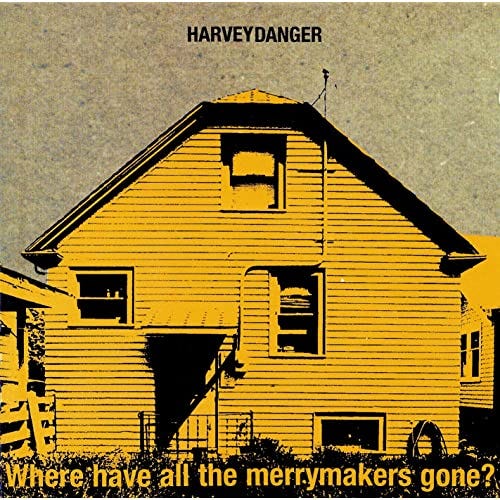8.11.2020 - Issue #4
Rachel Browne of Field Mouse talks Harvey Danger
Rachel Browne of Field Mouse thinks you need to get over yourself and just enjoy Harvey Danger’s Where Have All the Merrymakers Gone?

Rachel Browne of the band Field Mouse enjoying some light reading. Photo: Steven Levine.
Somedays, the tiny possibilities that have become available in these unimaginable times are enough to lift your spirits just a little bit. For instance, when life was still moving at full-steam, I’m not so sure that I would be reconnecting with so many friends over the phone, no matter how much I would have wanted to. That’s why it was so great to talk to my old pal Rachel Browne of the band Field Mouse for a wonderfully meandering phone call this past week. Ever since seeing her perform as a solo act when we both attended Purchase College over a decade ago, Rachel’s music has always remained so impactful and important to me.
While we talked about a lot of different things, the one thing I wanted to discuss with her, in particular, was her love of the 1997 alt-rock radio mainstay Where Have All the Merrymakers Gone? by the criminally misunderstood Seattle band, Harvey Danger. In this (edited down) interview, we talk about why this album deserves to be loved for more than the endlessly snarky and inescapable single “Flagpole Sitta”.
When I asked you to discuss one of your guilty pleasures, you suggested the first Harvey Danger album, Where Have All the Merrymakers Gone? What has been your experience with this album?
Rachel Browne: This album came out officially in the summer of 1997. I was not yet 12 that Summer. I think I probably heard a lot of “Flagpole Sitta” on the radio the following year of ‘97/’98 and then at some point bought the CD in that following Winter. I was 12 and I had Beatles albums and some contemporary stuff. I was obviously aware of Nirvana and other more mainstream “Grungy” stuff. I don’t remember buying it, but I remember listening to it a lot with my sister.
This was an era where, if I liked a single, the only way to hear it all the time was to go buy the single as a cassette or a CD. For whatever reason instead of buying the single — probably because I had heard it enough on the radio — I had bought the whole CD.... probably for like $20. I remember listening to it a lot the Summer after it came out. It was new to me, but not brand new. They were seemingly an anomaly that probably sold a lot of records that way from people hearing them on the radio.

Harvey Danger. Photo: Scott Gries/Getty Images.
Harvey Danger is such an interesting and unique sounding band and this album really works as a full listen. You can really track their influences as a band to some of the Indie Rock bands that came just before them. I see a lot of the Pixies and Silkworm in their DNA, but I can also see how Emo bands that followed them would have been into this record. Do you think this album would be regarded more as a touchstone to the Emo revival if it didn’t have a hit?
RB: I do. I think that especially that era of “one-hit-wonder” type bands gets a really bad rap. I remember reading that most of these songs were all recorded a few years before they exploded, like solidly in the mid-’90s. Like, ‘95 to ‘96. From late ‘97 to ‘98 — that’s peak radio time in my life where I heard the same 40 songs over and over again. There were a few of these bizarre “one-hit-wonder” bands that I’ve certainly never heard anything else from. I think they easily could have been one of those and I think they got lumped into that category by more people than not. That’s sort of how they’re remembered even though someone had repressed their album to vinyl in the last decade at some point. I’ve been able to get people to say “yeah, it’s good”.
They have an album after this [2000’s The King James Version] which I’m less familiar with, that people seem to like. I know they got lumped into a category with bands like Fastball who had one incessant single that would not die.
Did your love for this album stay strong since that time or was it something you put away and rediscovered when you were older?
RB: I think there was probably a year after I was listening to it on CD where I was in high school and I was trying to assimilate with my Punk friends where I might have been embarrassed to admit that I liked it during my peak insecure teen times. I think I’ve felt the same way about it since I first heard it. Now of course I have 20 years of perspective on it and I’m very solid with it. It didn’t reappear suddenly. I still have the CD. Certainly, in college, I was like, “Remember that album? That shit was good,” and I could already connect with people who felt the same way about it.
[The term] “guilty pleasure” is a weird thing. I get it, and I definitely have them. But I am also like, it’s 2020. Let’s all be cool with whatever music we like even if it’s not cool. I think we’ve folded in ourselves a little bit and we’re post-everything and there’s no line of what “cool” is anymore. We’re post-irony and post-everything. I think a lot of people would disagree that this could even be classified as a “guilty pleasure” because it’s like, yeah, it’s obviously good. Who are we trying to kid? Who are we trying to impress here?
When you look back at the time before the big Emo explosion of the 2000s you generally think of albums like Weezer’s Pinkerton as touchstones. The prevailing “Emo” quality about that album, in particular, is that Rivers Cuomo wrote these songs that created a very squeamish feeling within the listener. You feel like you are overhearing something that you shouldn’t be listening in on. I feel like this album goes far beyond Pinkerton in a lot of ways in that regard. Did Sean Nelson’s lyrics and presentation as a singer have a big effect on you?
RB: Yes! First, let’s talk lyrics... [his lyrics] are so strange and very wry. Dry humor is in everything. Even if it’s extremely upsetting, there’s this wryness about it. It’s smart. It’s not overly complicated but it’s kind of conversational and realistic enough to where you kind of know what he’s talking about or can project on to him what you think he’s talking about. It’s very real-sounding.
If we are comparing it to Weezer, there’s less posturing and more screaming. When I say “screaming”, I mean you can hear everything that he is saying. It’s not like Punk screaming. He’s just shouting the words to his songs and he feels pretty comfortable doing it without a lot of pretenses. I’m sure there were a lot of pretenses because that’s the way things were and are.
His vocal delivery … I was just listening to it this morning and it’s fuckin’ wild. I know that they made this album in pieces and that it was made for very little money, but his performance is so good. He could be screaming into any kind of shitty microphone, it doesn’t matter.
The piecemeal nature and lower budget overall on this record really give it a timeless quality.
RB: I am so interested in how this happened, too. Because it’s a Pacific Northwestern band. This is at the end of Grunge. But clearly they are aware of Built To Spill and true Indie-Rock. They made this album that could have been accepted into that canon maybe if they hadn’t had a hit. But they somehow got diverted. There are these little differences that maybe would have removed them from that category anyway. But, I don’t know. It’s impossible to remove our historical context of who they are, to separate that from the actual music. [The album is] really just Indie-Rock/Pop with a hit on it.
It’s funny, Sean Nelson’s lyrics take such a narrative tone on this album that if you only hear “Flagpole Sitta”, without hearing some of the long crescendoing ballads like “Radio Silence”, you might not get the whole picture.
RB: That’s interesting. The one that always stuck out for me is track 5, “Problems and Bigger Ones”. You could even argue that it’s too long, but it really does crescendo and has genuinely heartbreaking lyrics that still manage to be wry somehow. Even as a 12-year old I was like “What the fuck?” That could have easily been [a moment where I said] “ I’ll just skip over that and go to the next upbeat song,” but I never did. This is a “no skip” album for me.

If you were to try to convince someone to listen to this album, what would be a misconception that you would try to disprove?
RB: I mean, the obvious one is that they had that song and that song is the only good one. Because there are at least four other tracks on this album that could have been a hit like that, I think. Before we leave “Flagpole Sitta” alone, I just want to acknowledge that the chorus is just “Happy Together” by the Turtles, which is totally cool! That clicked with me at some point and I thought about how I loved that song as a kid and listened to ‘60s radio. That’s why the song hits me the way that it does.
I would try and let go of wherever you were when you heard the single, and maybe the album. I would try to remove the historical context and try and listen to it as a person who enjoys Rock music if you are a person who likes Rock music. Listen like no one is watching! See if you can allow yourself to enjoy it without the baggage because it is extremely enjoyable and really catchy and fun, but also really interestingly emotional in a way that I can’t compare it to anything else. It’s pretty bizarre. That may be my own context that I have when I associate it with my 12 or 13-year-old self. But, I do think that there is something special about the lyrics and their presentation and imagery. Even the imagery of the cover of the album combined with the lyrics. It’s effectively a world-building album if you allow it to be. No one cares if you are cool. Just listen to it and enjoy it.
You can (and should) check out the latest album from Field Mouse, ‘Meaning’, over at fieldmouse.bandcamp.com.
